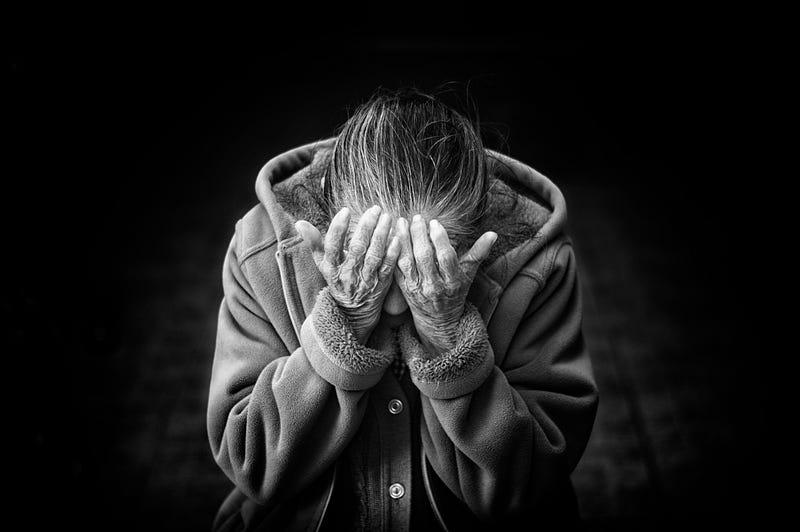And I'm powerless to change that.
 |
Photo by Cristian Newman on Unsplash
|
This is new for me. I am the resident Pollyanna, the believer in great things coming from ordinary people, the pusher of positivity when everyone else sees darkness ahead.
People come to me looking for answers, and if I don’t have the answers I think I can at least comfort them with my positivity. As if all it takes are a few sunny words accompanied by a knowing smile. As if those few moments of respite will solve anything.
What bullshit.
I was a picky eater and when my mom told me about starving kids in China who would give anything for even a bite of what I was refusing, I would cry just thinking about them, their poor, wasted bodies — skin and bones. But I still wouldn’t eat it. And when lunch was over I skipped away, on to something else.
Later, when I had my own kids, I did the same thing, only it was poor starving kids in Africa. It was a lousy way to teach about awareness — as if filling their bellies was all it would take to remove the awful images of wholesale, planned starvation and death.
I came into this world thinking I could save it with sympathy and empathy. I can’t remember a time I wasn’t feeling sorry about something I had no control over. But feeling sorry can’t take the place of actually doing something. It’s why we’re so sick of “thoughts and prayers”. It’s too easy. It’s a brush-off. It’s “Oh, poor you! Here — let me hand you a posy. Feel better now? I know I do.”
I wanted to do more. I threatened to do more. I promised to do more. I did what I did and it wasn’t nearly enough.
I’ve been a liberal activist for more than 60 years, calling, marching, protesting, singing, writing — all without once feeling violated or threatened. Throughout my long years of what I called ‘activism’ I was never in any danger. I’m not saying this out of guilt. I’m saying it because now I’m aware. I chose activism over complacency, but if I had been active enough I would have, at some point, felt the sting of fear. I never did.
No matter how incensed or enraged I become when I find out about terrible actions against individual or groups, I can’t begin to understand how it must feel to be in the middle of those danger zones. How it is to have to live with it throughout my entire life. I’m not there. I’ve never been there. I never will be there.
I’ve been a writer for more than 30 years, much of it dwelling on rights issues, but I’ve been safe there, too. For the last 10 years I’ve focused on writing to change minds, but that hasn’t happened. All the while I’m writing to make a difference, I’m marveling at the writers who get it. Those writers who spoke to us so vividly, so masterfully they made us gasp at the majesty of their words. Surely this would do it. This, this amazing piece of writing would change the world, or at least our country, or at least… But it didn’t. It doesn’t. They couldn’t do it, either.
I’m writing this now because yesterday I saw Bakari Sellers break down and cry on CNN. This man who sought to change us, to make us aware, to use his often brilliant prose to bring us to attention and DO SOMETHING, broke down out of a feeling of frustration and pure, agonizing helplessness.
The catalyst was yet another murder of an innocent black man, in broad daylight, with cameras rolling. The killer was a member of the Minneapolis Police Department. He put a knee to George Floyd’s neck and kept it there for nine minutes, as George pleaded for his life, called for his mother, said he was in pain, said “I CAN’T BREATHE”.
Other police officers stood there for those nine minutes and did nothing. They could have saved George Floyd, who wasn’t resisting, was crying out, was barely breathing after a few minutes of that pressure on his neck, but they didn’t.
Once again, the police officer wasn’t put in handcuffs immediately, wasn’t taken into custody for murdering a black man. We were assured that he would be fired. The authorities would look into it. They would ‘look into’ an incident that was witnessed by dozens of people, was filmed and sent out to the airwaves, was clearly, without a doubt, without provocation, a deliberate killing of an innocent man.
And Bakari Sellers wants to know how he’s going to explain this to his son. How does he keep his boy from being afraid when this same horrible scene happens over and over and over?
“There’s just so much pain,” Sellers said, sobbing, “I get so tired.”
Add Bakari Sellers to the long, long list of activists who work so hard, who try so hard, and who, when another tragedy happens, end up having to acknowledge how little they can actually do.
Then there are the rest of us. We have no power. The reality of our powerlessness is hard to take. All we can do is howl.
(Cross-posted at Medium)









